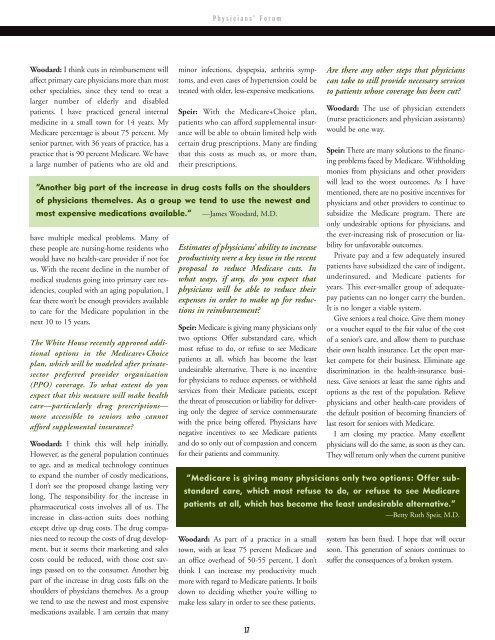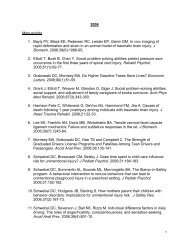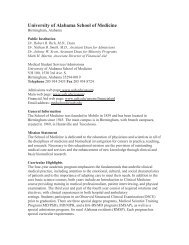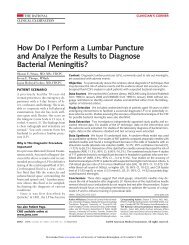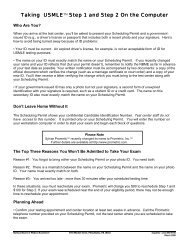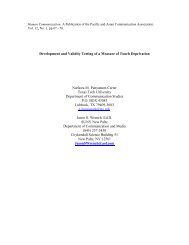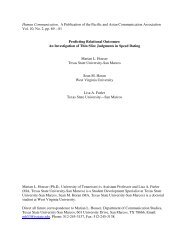AlumniBulletin - University of Alabama at Birmingham
AlumniBulletin - University of Alabama at Birmingham
AlumniBulletin - University of Alabama at Birmingham
Create successful ePaper yourself
Turn your PDF publications into a flip-book with our unique Google optimized e-Paper software.
Physicians’ Forum<br />
Woodard: I think cuts in reimbursement will<br />
affect primary care physicians more than most<br />
other specialties, since they tend to tre<strong>at</strong> a<br />
larger number <strong>of</strong> elderly and disabled<br />
p<strong>at</strong>ients. I have practiced general internal<br />
medicine in a small town for 14 years. My<br />
Medicare percentage is about 75 percent. My<br />
senior partner, with 36 years <strong>of</strong> practice, has a<br />
practice th<strong>at</strong> is 90 percent Medicare. We have<br />
a large number <strong>of</strong> p<strong>at</strong>ients who are old and<br />
have multiple medical problems. Many <strong>of</strong><br />
these people are nursing-home residents who<br />
would have no health-care provider if not for<br />
us. With the recent decline in the number <strong>of</strong><br />
medical students going into primary care residencies,<br />
coupled with an aging popul<strong>at</strong>ion, I<br />
fear there won’t be enough providers available<br />
to care for the Medicare popul<strong>at</strong>ion in the<br />
next 10 to 15 years.<br />
The White House recently approved additional<br />
options in the Medicare+Choice<br />
plan, which will be modeled after priv<strong>at</strong>esector<br />
preferred provider organiz<strong>at</strong>ion<br />
(PPO) coverage. To wh<strong>at</strong> extent do you<br />
expect th<strong>at</strong> this measure will make health<br />
care—particularly drug prescriptions—<br />
more accessible to seniors who cannot<br />
afford supplemental insurance?<br />
Woodard: I think this will help initially.<br />
However, as the general popul<strong>at</strong>ion continues<br />
to age, and as medical technology continues<br />
to expand the number <strong>of</strong> costly medic<strong>at</strong>ions,<br />
I don’t see the proposed change lasting very<br />
long. The responsibility for the increase in<br />
pharmaceutical costs involves all <strong>of</strong> us. The<br />
increase in class-action suits does nothing<br />
except drive up drug costs. The drug companies<br />
need to recoup the costs <strong>of</strong> drug development,<br />
but it seems their marketing and sales<br />
costs could be reduced, with those cost savings<br />
passed on to the consumer. Another big<br />
part <strong>of</strong> the increase in drug costs falls on the<br />
shoulders <strong>of</strong> physicians themelves. As a group<br />
we tend to use the newest and most expensive<br />
medic<strong>at</strong>ions available. I am certain th<strong>at</strong> many<br />
minor infections, dyspepsia, arthritis symptoms,<br />
and even cases <strong>of</strong> hypertension could be<br />
tre<strong>at</strong>ed with older, less-expensive medic<strong>at</strong>ions.<br />
Speir: With the Medicare+Choice plan,<br />
p<strong>at</strong>ients who can afford supplemental insurance<br />
will be able to obtain limited help with<br />
certain drug prescriptions. Many are finding<br />
th<strong>at</strong> this costs as much as, or more than,<br />
their prescriptions.<br />
“Another big part <strong>of</strong> the increase in drug costs falls on the shoulders<br />
<strong>of</strong> physicians themelves. As a group we tend to use the newest and<br />
most expensive medic<strong>at</strong>ions available.” —James Woodard, M.D.<br />
Estim<strong>at</strong>es <strong>of</strong> physicians’ ability to increase<br />
productivity were a key issue in the recent<br />
proposal to reduce Medicare cuts. In<br />
wh<strong>at</strong> ways, if any, do you expect th<strong>at</strong><br />
physicians will be able to reduce their<br />
expenses in order to make up for reductions<br />
in reimbursement?<br />
Speir: Medicare is giving many physicians only<br />
two options: Offer substandard care, which<br />
most refuse to do, or refuse to see Medicare<br />
p<strong>at</strong>ients <strong>at</strong> all, which has become the least<br />
undesirable altern<strong>at</strong>ive. There is no incentive<br />
for physicians to reduce expenses, or withhold<br />
services from their Medicare p<strong>at</strong>ients, except<br />
the thre<strong>at</strong> <strong>of</strong> prosecution or liability for delivering<br />
only the degree <strong>of</strong> service commensur<strong>at</strong>e<br />
with the price being <strong>of</strong>fered. Physicians have<br />
neg<strong>at</strong>ive incentives to see Medicare p<strong>at</strong>ients<br />
and do so only out <strong>of</strong> compassion and concern<br />
for their p<strong>at</strong>ients and community.<br />
Woodard: As part <strong>of</strong> a practice in a small<br />
town, with <strong>at</strong> least 75 percent Medicare and<br />
an <strong>of</strong>fice overhead <strong>of</strong> 50-55 percent, I don’t<br />
think I can increase my productivity much<br />
more with regard to Medicare p<strong>at</strong>ients. It boils<br />
down to deciding whether you’re willing to<br />
make less salary in order to see these p<strong>at</strong>ients.<br />
17<br />
Are there any other steps th<strong>at</strong> physicians<br />
can take to still provide necessary services<br />
to p<strong>at</strong>ients whose coverage has been cut?<br />
Woodard: The use <strong>of</strong> physician extenders<br />
(nurse practicioners and physician assistants)<br />
would be one way.<br />
Speir: There are many solutions to the financing<br />
problems faced by Medicare. Withholding<br />
monies from physicians and other providers<br />
will lead to the worst outcomes. As I have<br />
mentioned, there are no positive incentives for<br />
physicians and other providers to continue to<br />
subsidize the Medicare program. There are<br />
only undesirable options for physicians, and<br />
the ever-increasing risk <strong>of</strong> prosecution or liability<br />
for unfavorable outcomes.<br />
Priv<strong>at</strong>e pay and a few adequ<strong>at</strong>ely insured<br />
p<strong>at</strong>ients have subsidized the care <strong>of</strong> indigent,<br />
underinsured, and Medicare p<strong>at</strong>ients for<br />
years. This ever-smaller group <strong>of</strong> adequ<strong>at</strong>epay<br />
p<strong>at</strong>ients can no longer carry the burden.<br />
It is no longer a viable system.<br />
Give seniors a real choice. Give them money<br />
or a voucher equal to the fair value <strong>of</strong> the cost<br />
<strong>of</strong> a senior’s care, and allow them to purchase<br />
their own health insurance. Let the open market<br />
compete for their business. Elimin<strong>at</strong>e age<br />
discrimin<strong>at</strong>ion in the health-insurance business.<br />
Give seniors <strong>at</strong> least the same rights and<br />
options as the rest <strong>of</strong> the popul<strong>at</strong>ion. Relieve<br />
physicians and other health-care providers <strong>of</strong><br />
the default position <strong>of</strong> becoming financiers <strong>of</strong><br />
last resort for seniors with Medicare.<br />
I am closing my practice. Many excellent<br />
physicians will do the same, as soon as they can.<br />
They will return only when the current punitive<br />
“Medicare is giving many physicians only two options: Offer substandard<br />
care, which most refuse to do, or refuse to see Medicare<br />
p<strong>at</strong>ients <strong>at</strong> all, which has become the least undesirable altern<strong>at</strong>ive.”<br />
—Betty Ruth Speir, M.D.<br />
system has been fixed. I hope th<strong>at</strong> will occur<br />
soon. This gener<strong>at</strong>ion <strong>of</strong> seniors continues to<br />
suffer the consequences <strong>of</strong> a broken system.


